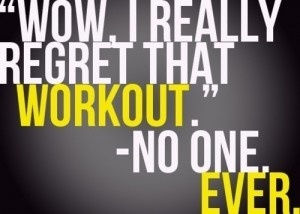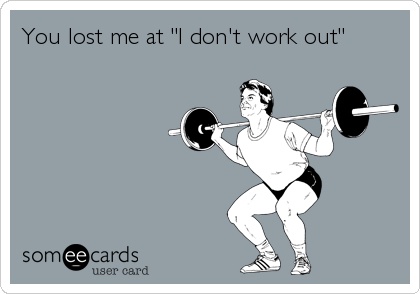 If you’ve ever worked within the fitness community, you know that discussing the comparative benefits of aerobics and resistance training is similar to debating politics with family and friends: people have some pretty strong beliefs (i.e., you should do cardio first, you should do cardio last…) and any conversation you have with someone who disagrees with you probably isn’t going to end that well! I say all this as a disclaimer, because I know there’s going to be plenty of weight lifting fans who aren’t going to be that fond of this study. So I just want to put it out there – I champion the fat-burning benefits of an increased resting metabolic rate (as the result of resistance training) just as much as the next gal! But when a new study comes out, well… it’s just my job to copy and paste ;)
If you’ve ever worked within the fitness community, you know that discussing the comparative benefits of aerobics and resistance training is similar to debating politics with family and friends: people have some pretty strong beliefs (i.e., you should do cardio first, you should do cardio last…) and any conversation you have with someone who disagrees with you probably isn’t going to end that well! I say all this as a disclaimer, because I know there’s going to be plenty of weight lifting fans who aren’t going to be that fond of this study. So I just want to put it out there – I champion the fat-burning benefits of an increased resting metabolic rate (as the result of resistance training) just as much as the next gal! But when a new study comes out, well… it’s just my job to copy and paste ;)
Ok, so here you have it: the latest chapter in the cardio vs. weight lifting saga!
(The following information is reprinted from materials provided by Duke University Medical Center):
Aerobic training is the best mode of exercise for burning fat, according to Duke researchers who compared aerobic training, resistance training, and a combination of the two.
The study, which appeared Dec. 15, 2012, in the Journal of Applied Physiology, is the largest randomized trial to analyze changes in body composition from the three modes of exercise in overweight or obese adults without diabetes.
 Aerobic exercise – including walking, running, and swimming – has been proven to be an effective way to lose weight. However, recent guidelines have suggested that resistance training, which includes weight lifting to build and maintain muscle mass, may also help with weight loss by increasing a person’s resting metabolic rate. Research has demonstrated health benefits for resistance training, such as improving glucose control, but studies on the effects of resistance training on fat mass have been inconclusive.
Aerobic exercise – including walking, running, and swimming – has been proven to be an effective way to lose weight. However, recent guidelines have suggested that resistance training, which includes weight lifting to build and maintain muscle mass, may also help with weight loss by increasing a person’s resting metabolic rate. Research has demonstrated health benefits for resistance training, such as improving glucose control, but studies on the effects of resistance training on fat mass have been inconclusive.
“Given that approximately two-thirds of adults in the United States are overweight due to excess body fat, we want to offer clear, evidence-based exercise recommendations that will truly help people lose weight and body fat,” said Leslie H. Willis, MS, an exercise physiologist at Duke Medicine and the study’s lead author.
Researchers enrolled 234 overweight or obese adults in the study. Participants were randomly assigned to one of three exercise training groups: resistance training (three days per week of weight lifting, three sets per day, 8-12 repetitions per set), aerobic training (approximately 12 miles per week), or aerobic plus resistance training (three days a week, three set per day, 8-12 repetitions per set for resistance training, plus approximately 12 miles per week of aerobic exercise).
 The exercise sessions were supervised in order to accurately measure adherence among participants. Data from 119 people who completed the study and had complete body composition data were analyzed to determine the effectiveness of each exercise regimen.
The exercise sessions were supervised in order to accurately measure adherence among participants. Data from 119 people who completed the study and had complete body composition data were analyzed to determine the effectiveness of each exercise regimen.
The groups assigned to aerobic training and aerobic plus resistance training lost more weight than those who did just resistance training. The resistance training group actually gained weight due to an increase in lean body mass.
Aerobic exercise was also a more efficient method of exercise for losing body fat. The aerobic exercise group spent an average of 133 minutes a week training and lost weight, while the resistance training group spent approximately 180 minutes exercising a week without shedding pounds.
The combination exercise group, while requiring double the time commitment, provided a mixed result. The regimen helped participants lose weight and fat mass, but did not significantly reduce body mass nor fat mass over aerobic training alone. This group did notice the largest decrease in waist circumference, which may be attributed to the amount of time participants spent exercising.
Resting metabolic rate, which determines how many calories are burned while at rest, was not directly measured in this study. While theories suggest that resistance training can improve resting metabolic rates and therefore aid in weight loss, in this study, resistance training did not significantly decrease fat mass nor body weight irrespective of any change in resting metabolic rate that might have occurred.
“No one type of exercise will be best for every health benefit,” Willis added. “However, it might be time to reconsider the conventional wisdom that resistance training alone can induce changes in body mass or fat mass due to an increase in metabolism, as our study found no change.”
Duke researchers added that exercise recommendations are age-specific. For older adults experiencing muscle atrophy, studies have found resistance training to be beneficial. However, younger, healthy adults or those looking to lose weight would see better results doing aerobic training.
“Balancing time commitments against health benefits, our study suggests that aerobic exercise is the best option for reducing fat mass and body mass,” said Cris A. Slentz, PhD, a Duke exercise physiologist and study co-author. “It’s not that resistance training isn’t good for you; it’s just not very good at burning fat.”
In addition to Willis and Slentz, Duke study authors include Lori A. Bateman, Lucy W. Piner, Connie W. Bales, and William E. Kraus. East Carolina University study authors include A. Tamlyn Shields and Joseph A. Houmard.
The study was funded with a grant from the National Heart, Lung, and Blood Institute, National Institutes of Health (2R01-HL057354).
References
Duke University Medical Center. (2012, December 15). Aerobic exercise trumps resistance training for weight and fat loss. Retrieved April 9, 2013 from ScienceDaily.
Willis, L.H., Slentz, C.A., Bateman, L.A., Shields, A.T., Piner, L.W., Bales, C.W., Hournard, J.A. & Kraus, W.E. (2012). Effects of aerobic and/or resistance training on body mass and fat mass in overweight or obese adults. Journal of Applied Physiology, 113(12). doi: 10.1152/japplphysiol.01370.2011
♥ Image sources: Lots of Pinterest pics today! Visit my Fitness Motivation page for original sources :)


This makes me feel better due to my lack of resistance training! I’m a cardio girl all the way! :)
I need to be! I don’t know why, cardio’s always been my enemy! Although I do love a good step class hehe ;)
I think this info is great, thanks for sharing. I personally love to do cardio first but I think it’s so important to do both. I wish I was better at doing strength training. Glad I found your blog!
Thanks for stopping by! I agree: both are really important! :)
The cardio vs. weight lifting debate is a saga indeed! I’m on the weight lifting band-wagon myself. This is just one study, but there’s a ton of research out there showing the opposite – that strength training trumps cardio when it comes to fat loss. I could go on for pages about that (*nerd alert*), so I’ll just leave it at that and anyone can feel free to email me if they have any more specific questions. But, I will say that BuiltLean actually wrote an article on this Duke study and had some excellent points on why it may be misleading. I’d definitely recommend checking it out. :) The link for anyone interested is: http://www.builtlean.com/2013/01/08/cardio-vs-weight-training/ Great topic!
Thanks so much Ali for all the info! I’ll def be checking out that article!! :)